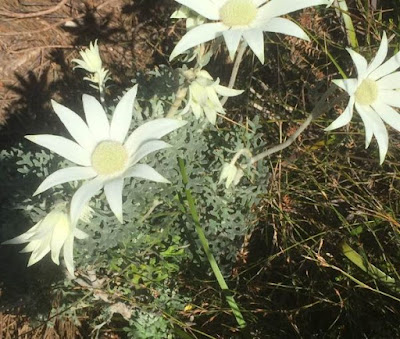When I read a book, I always pay attention to its title because it often encapsulates the author's decision to write that particular book. What was it that resonated with the author, that they would devote the long, arduous hours to writing all those pages?
Some titles, especially for family histories, make the book's content obvious from the start. Usually the family name forms part of the title, to make it easier for extended family members to find the book on various search engines. Some authors of family histories are more creative, such as my cousin (by marriage) John Jennings when he wrote 'A Lot about a Little'.
When I read Behrouz Boochani's powerful book 'No Friend but the Mountains', the author's choice of title did not mean anything to me until I'd read three-quarters of the book, when the author wrote about his home country. Similarly, readers of my book 'Margaret Flockton: A Fragrant Memory' had to reach her retirement years to discover the reason for my subtitle.
For my most recent book Sentenced to Debt: Robert Forrester, First Fleeter, published in 2020, the title was carefully chosen for three reasons. In 1783 in London Robert Forrester escaped his sentence to death and I liked the play on words. In 1794 in Australia he received a small free land grant beside a flood-prone river and my research proved that this sentenced him to a lifetime of actual debt. Today, his descendants everywhere are beginning to acknowledge that they remain in virtual debt to the original owners of the land taken from them by the colonial government without their permission.
 |
| More miseries: Being nervous and cross examined by Mr Garrow, Thomas Rowlandson, 1 April 1807 |
 |
| Flannel Flowers, Image courtesy Patsy Templeton, 2020 |
In May 1966, at my graduation ceremony at the University of Sydney, the Great Hall resounded with applause for Charlie Perkins, who’d led the famous Freedom Rides around New South Wales the year before. That day he became the first Aboriginal graduate of an Australian university.
When I voted for the first time in 1967, I happily joined the overwhelming majority vote at the Referendum for permitting the Federal government to make laws for Aboriginal people and count them within the census. We naively thought it would lead to an instant improvement in the lives of our country's original inhabitants.
In 1967 and 1968, just into my twenties, I taught mathematics to some Aboriginal children at South Dubbo High School but remained ignorant about the disadvantaged neighbourhood where they lived.
 |
| Re-visiting Dubbo, 1987 |
 |
| Cameragal Montessori School, 2012 |
 |
| Anchor Memorial, Thompson Square, Windsor, 1999 |
In 1999 my mother Julia Woodhouse and I stopped for a coffee in Windsor, on our way towards Wilberforce, the birthplace of my mother’s grandmother Varah Jane Bushell. We stood in front of the Pioneer Memorial in Thompson Square, looking for the name Robert Forrester. He was named as the father on the death certificate for Varah’s grandmother. The digital age had not arrived and I was tracking the family tree the old-fashioned way by working back through the official birth, death and marriage certificates for each generation. There he was, listed as an arrival in 1788.
It was only then that we realised that we were descended from a First Fleeter. Australian history has absorbed me ever since. And naturally I'll be voting in favour of The Voice at the forthcoming referendum.





No comments:
Post a Comment